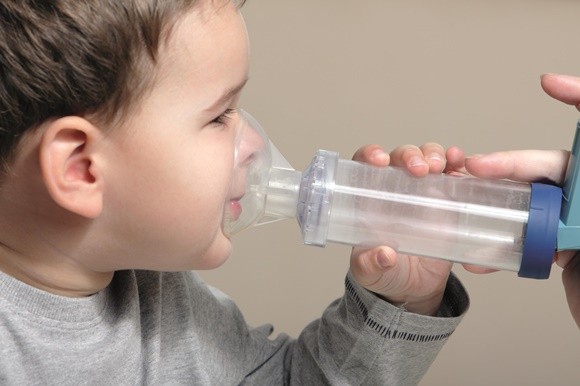By Charlotte Webster-
Asthmatic children are less likely to respond to inhaled steroids if they are overweight or obese, leading to more frequent asthma attacks, a study has found.
Asthma is caused by swelling (inflammation) of the breathing tubes that carry air in and out of the lungs. This makes the tubes highly sensitive, so they temporarily narrow.
Researchers say the data is the first to use information on genetic variants linked to body mass index (BMI) to investigate if a poor response to inhaled corticosteroids (ICS) is likely to be due to excess weight or to other factors.
These factors include things such as living in neighbourhoods with poor air quality or being exposed to cigarette smoke.These results suggest clinicians need to take a more personalised approach to treating overweight and obese children
Now an assistant professor at the University of Montreal, Canada, she said: “We know that children with asthma, whose symptoms are poorly controlled, tend to gain weight.
“This is possibly because they exercise less.
“Children with asthma who are overweight or obese are more likely to have worse symptoms despite being on the recommended treatment of inhaled corticosteroids, making it not only challenging to achieve a healthy weight but also to improve their quality of life.”
Researchers used data on 1,511 children with asthma, aged between two and 16, from five studies including in England and Scotland.
They were all using ICS and a poor response was defined as one or more asthma attacks needing urgent medical care and/or a course of oral corticosteroids.
Researchers developed a risk score based on the child’s age and sex, asthma diagnosis, asthma characteristics, BMI and allergies.
They also used information on exposure to harmful environmental triggers such as smoking, and genetic variants linked to BMI status that were identified from DNA extracted from blood, saliva, or nasal swabs samples.
In the risk score, the more BMI-related genetic variants a child had, the higher their score.
It was used to predict increases and decreases in the children’s BMI z-scores, which estimate how far and in what direction each child’s BMI deviates from the average normal value for a healthy child of the same age and sex.
A BMI z-score greater than one suggests a child is at risk of being overweight, greater than two suggests a child is overweight, and a score greater than three suggests the child is obese.
The predicted BMI z-scores were used to evaluate differences between the children in how they responded to ICS.
21% In the 1,511 children with asthma who were taking inhaled corticosteroids, 318 (21%) were obese
If there were more asthma attacks in children with a high BMI z-score than in children with a low score, it meant this was most likely to be due to their BMI rather than other external or environmental factors.
Asthma in children, sometimes goes away or improves during the teenage years, but can come back later in life.
The symptoms can usually be controlled with treatment. Most people will have normal, active lives, although some people with more severe asthma may have ongoing problems.
Dr Longo said: “In the 1,511 children with asthma who were taking ICS, the average BMI z-score was 0.69 and 318 (21%) were obese.
“Although poor ICS response ranged from 20% to 80% between the five international studies, we consistently show that the proportion of children with poor ICS response more than doubled for each one-unit increase in the BMI z-score.
“These results suggest clinicians need to take a more personalised approach to treating overweight and obese children.
“Paediatricians and asthma specialists need to be aware that children with higher BMI could be taking ICS without any benefit.
“However, whether alternative treatments, like biologicals, are more effective in this subgroup of children remains to be investigated.”
She added that for children and their parents, the results shed light on the reasons why some children may not be responding to their steroid inhaler as expected.
It may also be the catalyst parents and their children need to modify their diet and increase exercise.
Limitations of the study include the fact that in four of the five studies, data was collected at one point in time and so the researchers could not always confirm which came first, the ICS treatment or the asthma attack.
The research, which has not been peer-reviewed, was presented at the European Respiratory Society International Congress.




